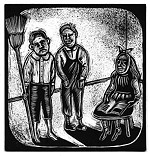Book Review: Readings
Elliott J. Gorn
Reviewed by Ada Calhoun, Fri., June 15, 2001
Mother Jones
The Most Dangerous Woman in Americaby Elliott J. Gorn
Hill & Wang, 352 pp., $27
With the current establishment turning its compassionately conservative cheek to the working class, there's a hole in this country's political fabric and it's shaped like Mother Jones. An Irish immigrant, Jones lost her iron-worker husband and four children in a Yellow Fever epidemic that swept through Memphis in 1867. After struggling through widowhood as a dressmaker (some later accused her of having been a prostitute as well), and witnessing injustice after injustice committed against freed slaves and the working class, she discovered her gift for oratory and adopted the Union as her new family and religion. The Union, she said, is the place "where you learn to know and love each other and learn to work with each other and bear each other's burdens, each other's sorrows, and each other's joys."
Jones traveled all over the country organizing key strikes in various states, painting an image of the Union as a family, herself as its mother. Mary Jones, née Harris, had led a relatively quiet life of dressmaking and marriage, but Mother Jones "declared herself a radical and said anyone who was not one had no business in America," Gorn writes. While she professed a hatred of violence, she was a big fan of drama, and her fans enveloped her in a halo of purple prose. The patron saint of class-consciousness, Jones hated rich people. Speaking about corporation owners, Jones told miners, "Our Kaisers have stomachs of steel and hearts of steel and tears of steel." Fearless and gifted at propaganda, she scared people. At one march in New York, she led approximately 60 marchers; closely watching them were 600 policemen. In 1902, a U.S. District Attorney allegedly called her "the most dangerous woman in America." She was thrown in jail several times, which only helped her cause.
While Gorn does not provide much speculation on Mother Jones' inner life (about which she reveals almost nothing in her autobiography), he manages to bring to life the vibrant political culture of the turn of the century. It was a wild time, he maintains. Radicals were everywhere. The Socialist party was huge. The New York Times came out against Jones' crusade to end child labor. But even as he praises Mother Jones' terrific courage, Gorn does not let Jones off the hook for her several mistakes: She called herself a Bolshevist before she knew what it meant (landing her in trouble later when everyone knew what it meant). She lied all the time, crafting eloquent fictions about her life and conversations with important people for rhetorical purposes.
For all her struggles, and despite a brief resurgence in the Sixties as a radical heroine, today Jones is almost forgotten, except through the magazine named for her. Nevertheless, during her reign as organizer, hundreds of thousands of American workers fought for and received better wages and working conditions. And regardless of all these strides, Jones saw activism as a goal unto itself. It's good, her legacy tells us, to get mad.










